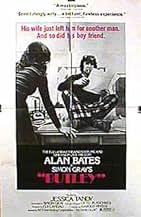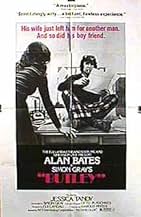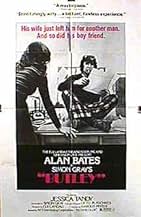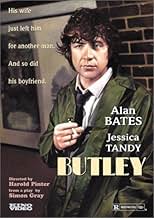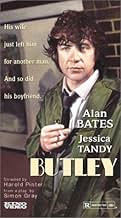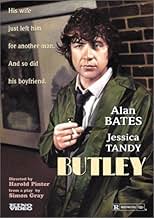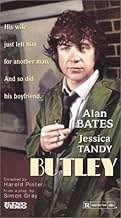Füge eine Handlung in deiner Sprache hinzuAn English professor finds his life crumbling around him.An English professor finds his life crumbling around him.An English professor finds his life crumbling around him.
Jill Goldston
- Tube Passenger
- (Nicht genannt)
Lindsay Ingram
- Female Student
- (Nicht genannt)
Anthony Lang
- Tube Passenger
- (Nicht genannt)
Patti Love
- Female Student
- (Nicht genannt)
Belinda Low
- Female Student
- (Nicht genannt)
Derrick O'Connor
- Irishman in pub
- (Nicht genannt)
John Savident
- James
- (Nicht genannt)
Susan Wooldridge
- Female Student
- (Nicht genannt)
Empfohlene Bewertungen
When I first saw this film, Ben Butley fascinated me (my cousin, who saw it with me, hated him). I've seen the film many times since then--I bought the video before I had a VCR to play it on--and it remains my favorite movie. And Alan Bates remains my favorite actor, although he's not at all like Butley. I wouldn't recommend the film to everybody, because it's a filmed play, totally in one room, all talk. Ah, but what talk, what dynamics between characters, what vicious game-playing and ruthlessness and humor. Simon Gray's never written a better play.
This American Film Theater presentation of Simon Gray's play about a bisexual professor of English whose life is in full collapse is a wordy affair. Alan Bates, in the title role, talks almost nonstop.... or perhaps I should say that he speaks. Harold Pinter directed this production like a stage play, and the performances are theatrical.
I found it impossible to work up any sympathy for Bates' character, who seems to have sabotaged his life through bad choices. Likely that was Gray's point. He taught at Queen Mary College for a quarter of a century, and this looks like an illustration of the irony that the in-fighting in academia is so vicious because the stakes are so small. Of course, these are people fighting for their lives, but they don't seem to care much for those lives, just in scoring hateful points off each other. In any case, I found the show as unpleasant as the self-absorbed characters.
I found it impossible to work up any sympathy for Bates' character, who seems to have sabotaged his life through bad choices. Likely that was Gray's point. He taught at Queen Mary College for a quarter of a century, and this looks like an illustration of the irony that the in-fighting in academia is so vicious because the stakes are so small. Of course, these are people fighting for their lives, but they don't seem to care much for those lives, just in scoring hateful points off each other. In any case, I found the show as unpleasant as the self-absorbed characters.
Simon Gray's extremely talky, darkly comic 1971 play is cinematized here, direct from the text, for television's American Film Theatre.
Doughy-faced and feckless-looking Alan Bates gives a bravura, nonstop performance as the eponymous sloppy, over-literate, misanthropic, washed-up English professor at the University of London. He is an unlikeable character, so there's no sympathizing with him; it's more like watching a train wreck.
But Bates inhabits the role fiercely, and makes him entertaining and lively -- and at times funny -- enough to hold our attention for the two-hour performance, 95% of which takes place in a single room. The room is Butley's office, which he shares with his longterm young lover Joey, now an assistant lecturer.
"Butley" feels a bit like Albee's "Who's Afraid of Virginia Woolf?", which was written nine years prior to Gray's play. Butley's verbal diatribes go for the jugular, but in allusive, literary or nursery-rhymey, uber-rhetorical, abstract, indirect, and bitterly sarcastic ways. It's a lot to pay attention to -- especially the literary quotes and allusions. And sometimes it's a bit much watching a man go through a slow meltdown in the guise of skewering anyone and everyone around him: Joey, his ex-wife, his students and colleagues, Joey's new love interest, and anyone who even tries to get close to or talk reason to him.
What seems like it might become unrelieved verbal cruelty is thankfully mitigated from time to time by the thoughtful, intelligent, gentle integrity of Joey (wonderfully played by Richard O'Callaghan, who, like Bates, originated his role), and by some real laugh-out-loud moments, and by a character or two who seem for a time to beat Butley at his own cruel mind games.
In the end, the play seems to come full circle metaphorically, giving the audience at least a sense of symmetry and unity and finally quietude before it closes. A worthwhile watch if you like cinematized plays or want more of the very impressive Alan Bates.
Doughy-faced and feckless-looking Alan Bates gives a bravura, nonstop performance as the eponymous sloppy, over-literate, misanthropic, washed-up English professor at the University of London. He is an unlikeable character, so there's no sympathizing with him; it's more like watching a train wreck.
But Bates inhabits the role fiercely, and makes him entertaining and lively -- and at times funny -- enough to hold our attention for the two-hour performance, 95% of which takes place in a single room. The room is Butley's office, which he shares with his longterm young lover Joey, now an assistant lecturer.
"Butley" feels a bit like Albee's "Who's Afraid of Virginia Woolf?", which was written nine years prior to Gray's play. Butley's verbal diatribes go for the jugular, but in allusive, literary or nursery-rhymey, uber-rhetorical, abstract, indirect, and bitterly sarcastic ways. It's a lot to pay attention to -- especially the literary quotes and allusions. And sometimes it's a bit much watching a man go through a slow meltdown in the guise of skewering anyone and everyone around him: Joey, his ex-wife, his students and colleagues, Joey's new love interest, and anyone who even tries to get close to or talk reason to him.
What seems like it might become unrelieved verbal cruelty is thankfully mitigated from time to time by the thoughtful, intelligent, gentle integrity of Joey (wonderfully played by Richard O'Callaghan, who, like Bates, originated his role), and by some real laugh-out-loud moments, and by a character or two who seem for a time to beat Butley at his own cruel mind games.
In the end, the play seems to come full circle metaphorically, giving the audience at least a sense of symmetry and unity and finally quietude before it closes. A worthwhile watch if you like cinematized plays or want more of the very impressive Alan Bates.
"Butley" is a film version of the play by the same name that also starred Alan Bates. This is fortunate, as so often when plays are brought to film, the producers completely recast the actors. And, I must say Bates did an amazing job in the lead.
That being said, although Alan Bates did a great job playing a very caustic man, the film itself if probably NOT something most folks will enjoy. He plays a cynical, lazy, nasty alcoholic....the type person you really WOULDN'T want to spend much time with nor build a film around them. In other words, Bates did a great job playing someone you'll strongly dislike...or worse. There really is NOTHING to like about Butley...nothing. And that is why this is an unusual film...very well made but thoroughly unenjoyable after a while.
That being said, although Alan Bates did a great job playing a very caustic man, the film itself if probably NOT something most folks will enjoy. He plays a cynical, lazy, nasty alcoholic....the type person you really WOULDN'T want to spend much time with nor build a film around them. In other words, Bates did a great job playing someone you'll strongly dislike...or worse. There really is NOTHING to like about Butley...nothing. And that is why this is an unusual film...very well made but thoroughly unenjoyable after a while.
One of the primary reasons for seeing this adaptation of 'Butley' is that it is one of the thirteen films making up the American Film Theatre series, which was an interesting and ambitious project but a flawed one. It is hard to go wrong with having a fine actor like Alan Bates, who sounded perfect and did two other films in the series (the others being 'Three Sisters' and 'In Celebration'). The play is good fun and Harold Pinter as director intrigued me, knowing him better for his play and screen writing.
'Butley' more than does the source material justice, managing to be faithful in detail and spirit to it without being too much so. It is easily one of the top 3 best films in the American Film Theatre series along with 'The Iceman Cometh' and 'The Homecoming' (the latter of which being written by Pinter and one of his finest plays) and by quite some way the best since 'The Homecoming'. It is highly recommended and has more to it than just curiosity value.
Pinter's direction is a little too laconic on occasion, which meant that the energy wasn't always consistent (this was fleetingly though).
A vast majority of it though is absolutely fine, very intelligent, precise and not losing the play's necessary exuberance. The script is talk-heavy, as is expected from a play, but it doesn't feel wordy. Instead it felt sharp, smart and amusing in a dark but never distasteful way.
It's a well shot and produced film, with not near as much of a too filmed play feel that most films in the American Film Theatre series suffer from. The energy is near constant. Once again the characters are deeply flawed but not one's definition of likeable (not a problem for me but this has been a criticism that has popped up in reviews for most of the series' films), but they are meaty and feel real.
While Jessica Tandy and Simon O'Callaghan are both excellent, the best thing about 'Butley' is the intense and exuberant tour de force performance from Bates.
Concluding, great and one of the series' best. 9/10.
'Butley' more than does the source material justice, managing to be faithful in detail and spirit to it without being too much so. It is easily one of the top 3 best films in the American Film Theatre series along with 'The Iceman Cometh' and 'The Homecoming' (the latter of which being written by Pinter and one of his finest plays) and by quite some way the best since 'The Homecoming'. It is highly recommended and has more to it than just curiosity value.
Pinter's direction is a little too laconic on occasion, which meant that the energy wasn't always consistent (this was fleetingly though).
A vast majority of it though is absolutely fine, very intelligent, precise and not losing the play's necessary exuberance. The script is talk-heavy, as is expected from a play, but it doesn't feel wordy. Instead it felt sharp, smart and amusing in a dark but never distasteful way.
It's a well shot and produced film, with not near as much of a too filmed play feel that most films in the American Film Theatre series suffer from. The energy is near constant. Once again the characters are deeply flawed but not one's definition of likeable (not a problem for me but this has been a criticism that has popped up in reviews for most of the series' films), but they are meaty and feel real.
While Jessica Tandy and Simon O'Callaghan are both excellent, the best thing about 'Butley' is the intense and exuberant tour de force performance from Bates.
Concluding, great and one of the series' best. 9/10.
Wusstest du schon
- WissenswertesFilm direction debut and sole film direction credit for Harold Pinter.
- Zitate
Ben Butley: I'm a one-woman man, and I've had mine, thank God.
Top-Auswahl
Melde dich zum Bewerten an und greife auf die Watchlist für personalisierte Empfehlungen zu.
- How long is Butley?Powered by Alexa
Details
- Laufzeit2 Stunden 9 Minuten
- Sound-Mix
- Seitenverhältnis
- 1.85 : 1
Zu dieser Seite beitragen
Bearbeitung vorschlagen oder fehlenden Inhalt hinzufügen



